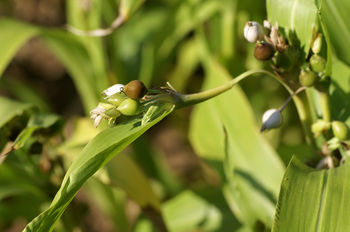Job's Tears
Other Names: Coix lachryma-jobi, Adlay, Adlay Millet, Adlay Seed, Chinese Pearl Barley, Coix, Coix Lachrymal, Coix Lachryma-jobi, Coix Lacryma, Coix lacryma-jobi, Coix ma-yuen, Coix Seed, Coix stenocarpa, Dehulled Adlay, Job's-tears, Larme de Job, Larmes de Job, Hiob's Tränen-Gras, Hiobsträne, Jobinkyynelheinä, Jobs Tårar, Juzudama, Lagrimas de Job, Lágrimas de Job, Lagrimas de San Pedro, Soft-shelled Job's Tears, Yi Hato-mugi, Yi Yi, Yi Yi Ren.
Job's tears is a broad-leaved, branched grass. It is native to China, India, Pakistan, Sri Lanka, and Malaysia. It is considered a nutritious health food in Asian countries. The seeds of Job's tears are tear-shaped and come in several colors including yellow, brown, white, and purple. The seeds are sometimes used as ornamental beads. The root and seed of the plant are sometimes used as a medicine.
Contents
Special Precautions of Job's Tears
- Job's tears seems to be safe when in food amounts. There isn't enough information to know if taking Job's tears in pills as a supplement is safe.
- Pregnancy and breast-feeding: It might be UNSAFE to take Job’s tears if you are pregnant. Research in animals suggests that it can poison a developing embryo. It can also cause the uterus to contract, and this might harm the pregnancy.
- No one knows whether if it is safe to use Job’s tears during breast-feeding. Stay on the safe side and avoid use.
- Surgery: Job's tears might lower blood sugar levels. There is some concern that it might interfere with blood sugar control during and after surgery. Stop using Job’s tears at least 2 weeks before a scheduled surgery.
- Medications for diabetes (Antidiabetes drugs) interacts with Job's tears.
The benefits of Job's Tears are
Job’s tears seeds have been reported to have anti-cancer, hypolipidemic, hypoglycemic, antioxidant, anti-inflammatory, and anti-allergic properties. The demand for Job’s tears is increasing rapidly with its medical use, but knowledge on genetic diversity and quality evaluation of Job’s tears is still limited.
- High cholesterol. Developing research suggests that consuming Job's tears in place of rice for 4 weeks can significantly lower total and “bad” low-density lipoprotein (LDL) cholesterol in people with high cholesterol. This effect may be due to the fiber in Job’s tears.
- Allergies.
- Cancer.
- Warts.
- Toxoplasmosis, a parasitic infection.
- Arthritis.
- Obesity.
- Respiratory tract infections
- Alergies : Suppression of Allergic Reactions by Dehulled Adlay in Association with the Balance of Th1/Th2 Cell Responses
- Ulcers : Gastroprotective Activities of Adlay (Coix lachryma-jobi L. var. ma-yuen Stapf) on the Growth of the Stomach Cancer AGS Cell Line and Indomethacin-Induced Gastric Ulcers.
- Cancer : An anticancer drug made of Job’s tears seed oil, Kanglaite, has been applied clinically in China and proven effective in treating multiple cancers. Kanglaite is the first drug derived from a traditional Chinese herbal remedy that was approved by the USA Food and Drug Administration to undergo clinical trials in the United States.
- Colon Cancer : a study has suggested the anti-colon cancer potential of the non-cooked hull Job’s tears extract from Thai Black Loei cultivar prepared by the cold methanol extraction.
- Liver Cancer : Advancements in Kanglaite Treatment of Primary Liver Cancer. Chinese Journal of Clinical Oncology. 2012; 39: 1143–1147. 10.3969/j.issn.1000-8179.2012.16.002
- Lung Cancer : A Review of Kanglaite Treatment for Non-small Cell Lung Cancer. Chinese Journal of Clinical Oncology. 2012; 39: 1139–1142. 10.3969/j.issn.1000-8179.2012.16.001
- Pancreatic Cancer : Progress in Advanced Pancreatic Cancer Treatment with Kanglaite Injection. Chinese Journal of Clinical Oncology. 2012; 39: 1158–1160. 10.3969/j.issn.1000-8179.2012.16.006
